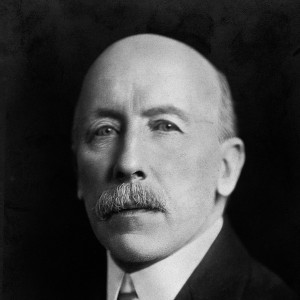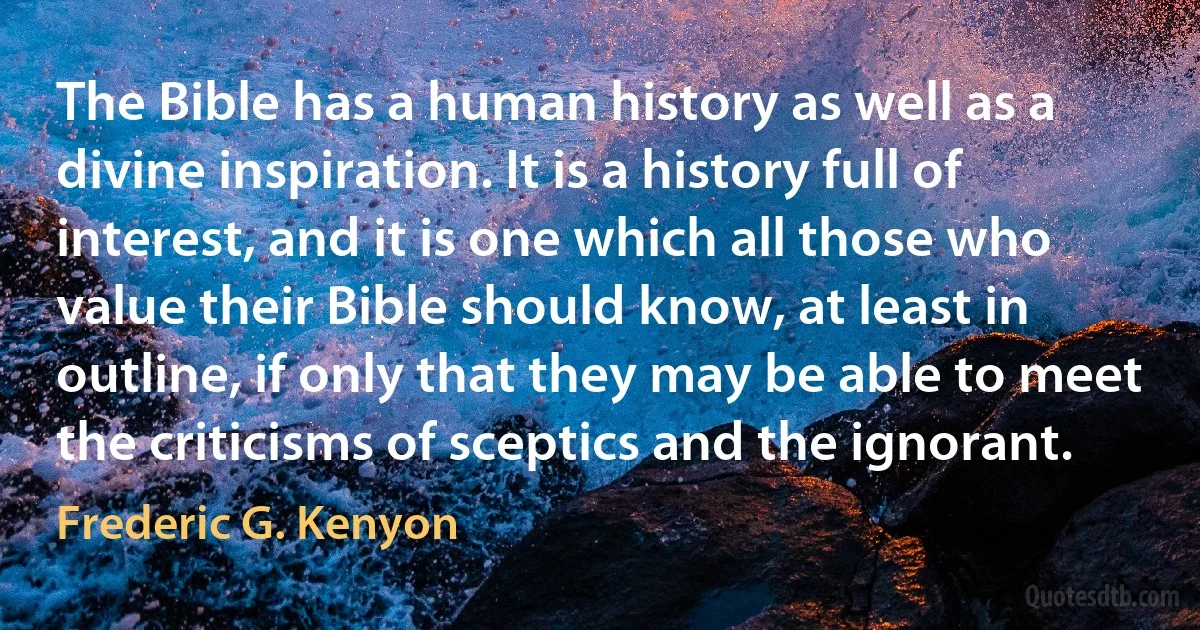Frederic G. Kenyon quotes
It is indeed a striking proof of the essential soundness of the tradition that with which all these thousands of copies, tracing their ancestry back to so many different parts of the earth and to conditions of such diverse kinds, the variations of text are so entirely questions of detail, not of essential substance.

Frederic G. Kenyon
The apostles were scattered, and even the leaders of the Church in Jerusalem had neither the power nor the means to impose uniformity.In these circumstances, we must imagine the literature of Christianity as spreading gradually, irregularly, and in a manner which variations inevitable.

Frederic G. Kenyon
The New Testament was not produced as a single work issued by an authoritative Church for the instruction of its members. The four Gospels were composed in different times and places over perhaps a third of a century, and for a time circulated separately among a number of other narratives of our Lord's life (of which the newly discovered fragment of an unknown gospel may have been one).

Frederic G. Kenyon
Seldom can two such epoch-making events have occurred in successive years as happened then. In 1453 the Turks stormed Constantinople and finally destroyed the Greek Empire, driving out Greek scholars, who carried the knowledge of Greek language and literature to the western world; and in 1454 the first document known to us appeared from the printing press at Mainz.

Frederic G. Kenyon
All we can say is that, as the result of a process which went on from the fourth century to about the eighth, a standard type of text was produced, which is found in the vast majority of the manuscripts that have come down to us. At least ninety-six per cent of the extant manuscripts of the Greek New Testament are later than the eighth century; and of those only a handful preserve traces of the other types of text which were in existence before the adoption of the standard text, and out of which it was created.

Frederic G. Kenyon
The Gospels were not thought of as works of literature. People were not concerned with the literary reputation of Matthew or Mark, but with the substance of their records of our Lord's life. They did not have to respect their actual words, as they would if they were transcribing the works of Thucydides or Plato.

Frederic G. Kenyon
The history of the Bible text is a romance of literature, though it is a romance of which the consequences are of vital import; and thanks to the succession of discoveries which have been made of late years, we know more about it than of the history of any other ancient book in the world.

Frederic G. Kenyon
It is a fascinating story to those who care for their Bible. It is the life-history of the greatest of books, diversified by interesting episodes which appeal to our human sympathies; and we venture to think that the result is reassuring. It may be disturbing to some to part with the conception of a Bible handed down through the ages without alteration and in unchallenged authority; but it is a higher ideal to face the facts, to apply the best powers with which God has endowed us to the solutions of the problems which they present to us; and it reassuring at the end to find that the general result of all these discoveries and all this study is to strengthen the proof of the authenticity of the Scripture, and our conviction that we have in our hands, in substantial integrity, the veritable Word of God.

Frederic G. Kenyon
Frederic G. Kenyon
 Born: January 15, 1863
Born: January 15, 1863
Died: August 23, 1952
Quotes count: 14
Wikipedia: Frederic G. Kenyon






